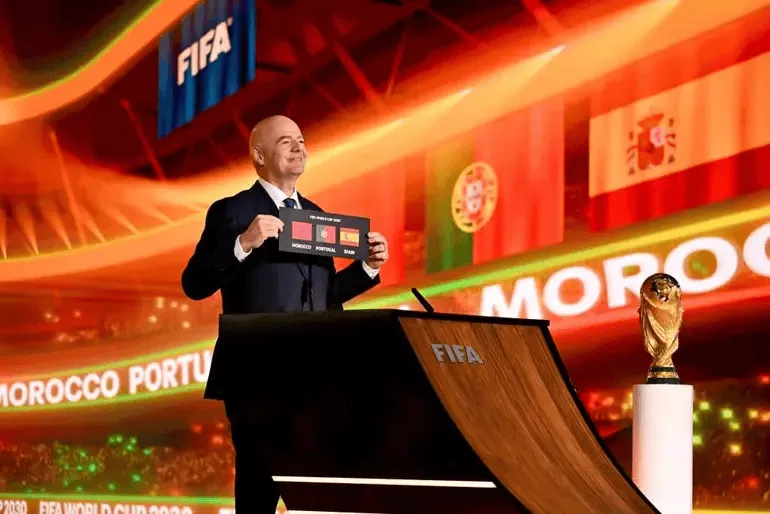
Prior to this, the South American delegation had formally put forward this proposal. Members of the delegation included the heads of state of Paraguay and Uruguay, senior football officials from CONMEBOL (Confederación Sudamericana de Fútbol), and the President of the Argentine Football Association (AFA).
At FIFA's New York headquarters located in Trump Tower, FIFA President Gianni Infantino and Secretary-General Matthias Grafström received a number of political figures and football officials from Paraguay, Argentina, and Uruguay.
Alejandro Domínguez, CONMEBOL President and FIFA Vice-President, chaired the discussions on behalf of the visiting delegation. Also in attendance were Chiqui Tapia, President of the Argentine Football Association, as well as Robert Harrison (President of the Paraguayan Football Association) and Nacho Alonso (President of the Uruguayan Football Association).
Ignacio "Nacho" Alonso, President of the Uruguayan Football Association, first proposed the 64-team plan at the FIFA Council meeting in March this year. The proposal came as a surprise to many attendees, but FIFA stated that it is obligated to consider opinions put forward at the Council meetings.
In April this year, Domínguez presented the plan to CONMEBOL's own Congress. He stated that the concept of a 64-team tournament would be a one-off measure to commemorate the 100th anniversary of the first men's World Cup (held in Uruguay in 1930).
At the FIFA Congress held in Paraguay in May this year, Domínguez urged FIFA to think about how to host the centenary World Cup in a unique way. He drew a comparison between how people celebrate their 49th or 51st birthdays and how they celebrate their 50th, noting that room should be made for special events.
"I want to invite everyone to reflect together so that we can do what the world expects, what football deserves. That's what football teaches us—teamwork," said Domínguez.
A 64-team World Cup would mean that more than 30% of FIFA's 211 registered national teams would participate in the tournament.
The idea has faced opposition since earlier this year. Aleksander Čeferin, UEFA President and FIFA Vice-President, called it a "bad idea," arguing that it would harm the tournament itself and also impact the qualifying stage—a phase that could otherwise help further mitigate participation risks.
Victor Montagliani, President of CONCACAF (Confederation of North, Central American and Caribbean Association Football) and FIFA Vice-President, also voiced his opposition to the idea, saying: "This is not a good idea. We haven't even played under the 48-team format yet; obviously, they can learn as they please, but this just doesn't feel right."
The 2030 World Cup is already FIFA's largest-ever tournament to date, as it will be hosted across three continents and six countries. The event will be co-hosted by Paraguay, Uruguay, and Argentina—each of which will stage one match at the start of the tournament—while the remaining fixtures will be shared by Spain, Portugal, and Morocco.
However, South American countries believe this compromise is inadequate. The South American continent has only hosted one men's World Cup in recent times, which was held in Brazil in 2014. The previous hosting before that was in Argentina in 1978. In the intervening period, Europe has hosted five World Cups, while Asia has hosted two.
Due to FIFA's confederation rotation principle, CONMEBOL has extremely low participation in the 2030 World Cup and may even be excluded from the 2034 and 2038 editions.
This means a confederation must wait for two World Cups to pass before being eligible to host again. However, as the World Cup grows in scale and involves more countries and continents, it remains to be seen how strictly this rule will be enforced.
Multiple sources familiar with the matter confirmed that this idea was formally put forward at the meeting held at Trump Tower on Tuesday. These sources requested anonymity to protect relations between the involved parties.
The specific format details for the 64-team tournament have yet to be confirmed, but during the meeting, Domínguez suggested that Paraguay, Argentina, and Uruguay could each host a separate group stage in the World Cup.
On Tuesday evening, attendees posted clips of the meeting on Instagram.
In a video posted on his account, Domínguez said: "This cannot be just an ordinary event, not just an ordinary World Cup. We see this as a once-in-a-century opportunity." He proposed that the three South American countries could each host a group stage.
Before the meeting, he uploaded a video filmed on the streets of Manhattan. He stated that he was about to attend an "extremely important" meeting and expressed hope of bringing news that could have an impact on football.
Paraguayan President Santiago Peña later posted a video of himself at the meeting, saying: “We want to challenge ourselves. We are encouraged to dream—to dream big. I say with humility but great responsibility: Paraguay is ready. We aspire to be protagonists.”
In the same video, Infantino also appeared to offer encouragement. He told everyone present: “Today, we truly begin to work together as one to make history. Let's join forces and explore together how to create something that the world will never forget, because that's what the people deserve.”
When Camel Live asked about the Tuesday meeting, FIFA referred to its stance from March, when it stated that it is obligated to analyze any proposals put forward at FIFA Council meetings.




